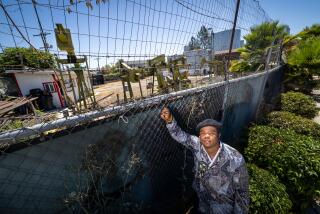Activist Spent Lifetime Fighting the Good Fight--for Many
- Share via
They came Sunday to celebrate the unsinkable Clara Fraser, a former Boyle Heights girl and raspy-voiced socialist-feminist who in a restless half-century of activism championed the causes of everyone from blue-collar workers and gays to women, prisoners and American Indians.
The 74-year-old Fraser, who died in February of emphysema in her Seattle home, was remembered by friends and family as a scrappy street fighter and union sympathizer who never met a labor-rights battle she didn’t relish.
When she wasn’t being black-listed as a communist in the 1950s and 1960s or hounded as a socialist sympathizer by FBI agents, friends said, Fraser picketed big business throughout the Northwest, led Washington state’s first abortion rights protest, battled on behalf of tribal fishing rights and marched against the Vietnam War and South African apartheid.
At a Los Angeles community center, fellow organizers and family members remembered a self-styled activist whose passions and politics are rarely seen in an era of a what’s-in-it-for-me mentality and corporate bottom lines.
“What Clara Fraser stood for was that tradition of Jewish secular radical history that relates to the downtrodden, and that was the fight of her life,” said friend and fellow organizer Megan Cornish.
At the center on Sunday, Fraser’s iconoclastic life was memorialized through poems and songs, including “You Ain’t Done Nothing If You Ain’t Been Called a Red.”
Although she lived most of her life in Seattle, Fraser is being remembered in a series of memorials in Los Angeles, San Francisco, Portland and Seattle.
In Seattle, the mother of two helped found the arch-feminist group Radical Women in 1967 as well as the international Freedom Socialist Party. She was arrested more than a dozen times in her life and published a collection of her writings, titled “Revolution, She Wrote,” a month before her death.
“For her, to be called a communist was a compliment, a badge of honor,” Cornish said. “Because she believed it was all just another label in the fight for human liberation.”
Fraser was born in East Los Angeles to Jewish immigrant parents; her mother, Emma, was a garment worker organizer, and her father, Samuel, an avowed anarchist and Teamster truck driver.
“We were raised as radicals,” recalled Fraser’s younger sister, Flory Adler of Long Beach. “In our house, you didn’t cross union picket lines. If May Co. went on strike, well then, you just didn’t shop there.”
Graduating from UCLA, Fraser worked as a screenwriter and joined the Socialist Worker’s Party, taking part in a union-organizing drive at a Chicago department store where she wrote advertising copy before moving to Seattle in 1946.
As a labor leader in the 1948 strike against aircraft-manufacturer Boeing Co., she was later blacklisted as a communist and hounded by the FBI, friends said.
At one point, friends said, Fraser even had to change her name as agents repeatedly sought her out and tried to have her fired from various jobs that included waitress, sales clerk, bus cleaner, camp counselor, electrician, cab driver and secretary.
In 1974, a year after she joined Seattle’s municipal power company to start an affirmative action program, Fraser took part in a protracted labor battle--leading an 11-day wildcat walkout in support of striking electricians.
“For Clara, the strike couldn’t have come at a worse time--just as her hiring program went into effect,” Cornish recalled. “If she went out on strike, her program was doomed.
“So she thought for about 30 seconds and said, ‘Consequences be damned! I’m a labor person. I can’t cross a picket line!’ ”
Fraser was later fired for her role in the strike but, after filing what she called a “political ideology suit,” she was reinstated seven years later with $135,000 in back pay.
At one point, friends recalled, Gordon Vickery, the head of Seattle City Light, said he would “hire Clara back in a minute if she was as loyal to her job as she was to Karl Marx.”
Said Cornish: “To which Clara replied, ‘That’s absolutely right, I’m far more loyal to Karl Marx than I could ever be to Gordon Vickery!’ ”
Friends said such battles defined Fraser.
They recalled watching Fraser after a long day of rallying troops against the utility, spending hours on the telephone, planning the next day’s activities.
“She was so relaxed, the happiest I’d probably see her in her entire life,” Cornish said. “Battling management; organizing with friends.”
Called abrasive by her critics, Fraser reminded fellow organizers that the civil rights wars could only be won if they rallied the causes of the downtrodden into a single decisive battle.
“She always pushed us to organize allies,” said fellow organizer Muffy Sunde. “As women, she’d never let us say, ‘Oh, the guys all hate us.’ She’d say, ‘You have allies out there, even if they don’t know it yet. Your job is to convince them.’ ”
Like she fought unfair management practices on the picket lines, Fraser battled emphysema for three years before finally dropping her fists.
Days before her death, the lifelong rebel who loved chocolates, cigarettes and mystery novels, called her sister in Long Beach. “She just said, ‘Flory, I’m tired.’ She was tired of fighting to breathe,” Adler said.
But then Adler remembered what her sister always told her.
“She’d say, ‘Don’t get mad, organize!’ So that’s what we did. We organized a way to finally say goodbye to her.”
More to Read
Sign up for Essential California
The most important California stories and recommendations in your inbox every morning.
You may occasionally receive promotional content from the Los Angeles Times.











